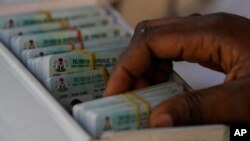Nigeria decides Saturday who will serve as its leader. The candidate field is crowded – many names are on the roster as term-limited President Muhammadu Buhari’s successor.
At the forefront of the race stand All Progressives Congress nominee Bola Tinbu, the People’s Democratic Party’s Atiku Abubakar making his sixth bid and from Anambra State, the Labor Party’s Peter Obi. But all candidates have their megaphones and supporters – and they’re trying to make an impact right now as the election begins.
What Gallup heard from 94% of the Nigerians surveyed was a pervasive belief that government corruption is real and widespread.
They also said government corruption is as bad today as it was back in 2015 when incumbent Muhammadu Buhari won the presidency on a clean up campaign. Survey respondents said they felt things improving the first several years, then, it went back to the usual.
That public skepticism extends to perceptions about elections. Gallup says that in 2022, only 23% of the Nigerians surveyed felt elections were honestly conducted. That figure is sharply lower than the 34% in 2018 who felt confident about Nigeria’s elections.
Gallup found a sharp contrast by region in perception of election validity. While 46% of Nigerians in the North East expressed confidence, only 1% of Gallup’s South East respondents felt that way. The North West region was the second-lowest scorer with a 6% confidence mark.
The second-highest region for election confidence was the South West at 35%, followed by North Central’s 32%. The South posted a 21% mark.
Gallup also noted that voter turnout in the last 2019 election was only 35%, which the polling organization said reflected perceptions of corruption and what it termed “foul play.”
When pollsters asked Nigerians which they trusted more — the government or the military — the difference was striking.
While 69% professed support for the national military, only 31% of Nigerians that Gallup surveyed chose the government in Abuja.
Another set of serious problems voters go to the polls mindful of are the ravages of inflation above 20% in 2022’s second half coupled with currency problems. And this has translated into food and shelter insecurity for a number of Nigerians.
Across the country, Gallup found 74% of the people surveyed had financial problems getting adequate food in 2022, and 48% had shelter difficulties.
Gallup’s survey of the South found 89% of those responding saying they had times over the past year when they didn’t have money for sufficient food. The South West (85%) and South East (84%) were close behind.
The currency changeover has also caused misery for Nigerians, according to Gallup and numerous others. Terminating old notes and replacing them has caused long queues and shortages. The government has extended the changeover date multiple times – with April 10 being the latest, beyond the presidential election.
Yet another concern on voters’ minds is personal safety. Nigeria has had its share of terrorism, criminal gangs, kidnappings for ransom and property crimes that don’t give people the security they need to live in peace.
Gallup asked Nigerians if they felt safe out walking at night. The latest poll shows only 51% of Gallup’s respondents saying so. In 2015, when Buhari took office, that number was 61%.
There’s a marked divide on that issue between Nigeria’s Muslims and Christians. While 69% of Muslims said they felt safe out after dark, only 39% of the Christians surveyed said the same.
Gallup ended its pre-election survey by stating what many both inside and outside Nigeria have said: The government must restore both confidence by the electorate in its operations and elections, as well as address endemic problems that destabilize security for its people.
Gallup said this survey was compiled from direct-contact interviews with 1,000 persons aged 15 and older. This was done last year between Sept. 21 and Oct. 16. Gallup says the margin of error for this survey was 4.9 percentage points at the 95% confidence level.
In the geographic breakouts, Gallup says the three northeastern states of Adamawa, Borno and Yobe were not included due to security issues including the ongoing Boko Haram insurgency.








